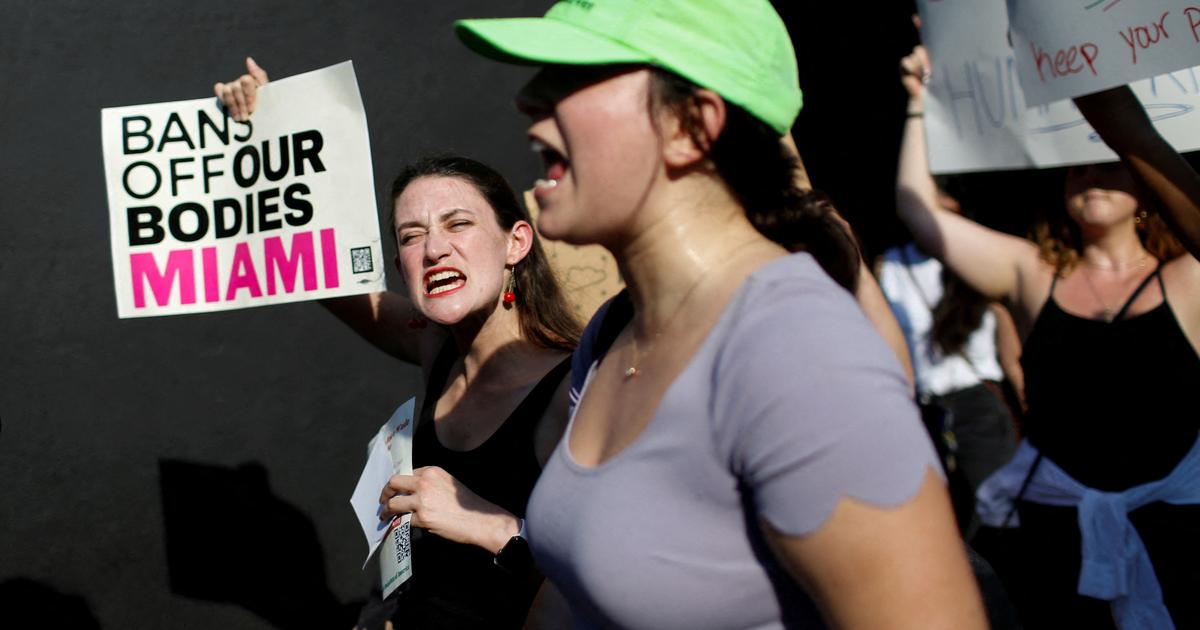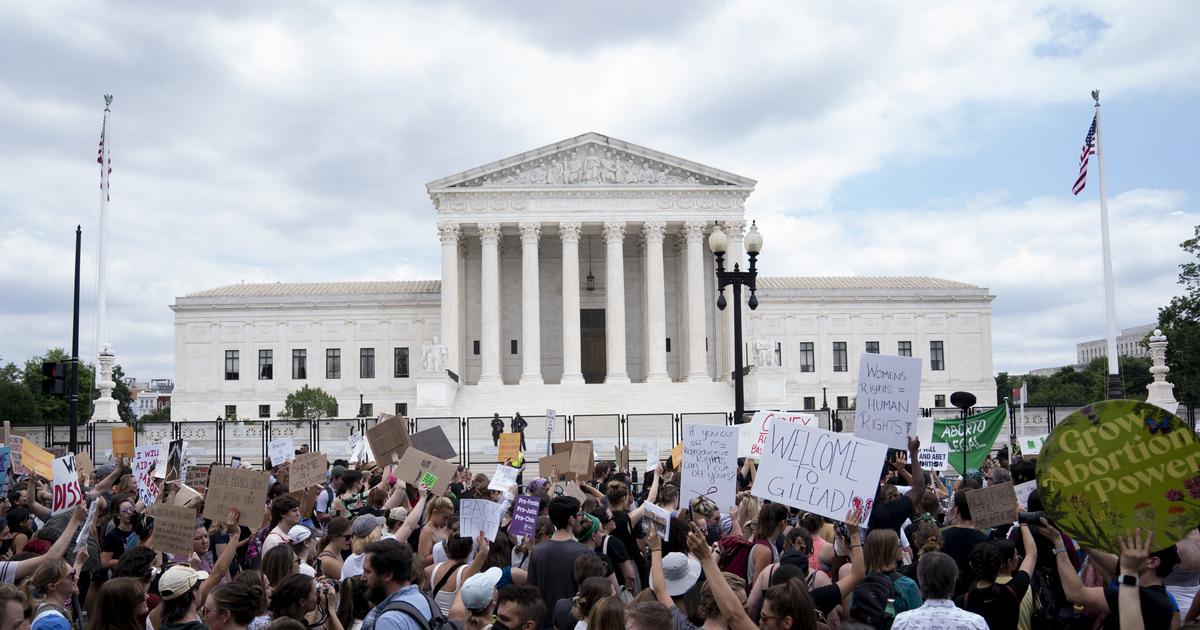At the White House, Joe Biden promised this Friday to use his power as president of the United States to protect women's right to abortion.
Just a few streets away, Claire, a 20-year-old student, joined thousands of others in the March for Life to the Capitol and the Supreme Court to demand more restrictions on the freedom to terminate a pregnancy.
“Our fight is not over.
It is more important than ever ”, she assured convinced behind her round glasses.
The group of her friends nodded.
This Sunday marks the 50th anniversary of the Roe v. Wade ruling, which in 1973 legalized the right to abortion throughout the United States.
And the first of those anniversaries in which that decision of the Supreme Court no longer protects that freedom.
The judges of the highest court in the United States ruled last June that that opinion had been wrong.
The decision to allow or prohibit abortion, and under what circumstances, would depend on each of the states.
Something that has increased the already deep divisions in the country, unleashed an avalanche of legislation of both kinds and encouraged supporters and opponents to entrench themselves in their positions.
“El Supremo got Roe right 50 years ago.
It was a balanced decision with the broad national support that most Americans have continued to support for the past 50 years.
And it was a constitutional principle upheld by judges appointed by both Democratic and Republican presidents,” Biden noted in his anniversary proclamation.
“I will continue to appeal to Congress to pass measures that make [abortion rights] protections law once and for all.
Until then, I will continue to use my presidential power to protect women and families from the consequences of the Dobbs decision."
Biden was referring to the Supreme Court ruling in June, which decided on a lawsuit filed in Mississippi, Dobbs against the Jackson Women's Health Organization, a reproductive health clinic that offered pregnancy interruptions.
That decision did not come as a surprise: a first draft had already been published two months earlier, in an unprecedented leak in the Supreme Court and whose authorship is still unknown.
But it did generate numerous protests.
The majority of Americans, according to polls, are in favor of maintaining this right.
A Pew Center poll revealed last year that 62% of adult residents in the country believe that abortion should be legal, compared to 36% who believe that it should be outlawed in all or most circumstances.
The fury unleashed among much of the female electorate had political consequences: as a bloc, the women leaned in favor of the Democratic Party in the midterm elections in November.
This match achieved better results than expected.
He entrenched his control of the Senate and only lost the House of Representatives, currently in Republican hands, by a handful of seats.
More information
The anti-abortion movement in the US plans its next steps after the end of Roe against Wade
But after that sentence, a dozen states where the Republican Party governs have approved legislation that almost completely restricts the right to abortion.
This is the case of Alabama, Arkansas, Idaho, Oklahoma or West Virginia, among others.
In some instances, these measures are pending judicial review.
In other states, there is simply no access to the right to abortion at all.
In the case of Wisconsin, due to the legal uncertainty surrounding the situation of the doctors who practice it.
In North Dakota, the only clinic that practiced it moved to another state.
But the Supreme Court ruling also generated a counterreaction.
States like California, Vermont or Michigan voted in the November mid-term elections in favor of protecting the reproductive rights of women in their jurisdictions.
Kentucky, and a few months earlier Kansas, rejected bills that would have written the ban on abortion into local constitutions.
This month, the South Carolina Supreme Court struck down a state law that barred abortions for pregnancies longer than six weeks, arguing that the ban violated privacy rights.
“Numerous states have passed near-absolute abortion bans with very limited exceptions, or have banned the procedure from very early in gestation.
Courts have struck down some of those bans, bringing with it a chaotic legal landscape that is detrimental to clinics trying to offer care to patients and patients trying to receive it," Elizabeth Nash and e Isabel Guarnieri, from the Guttmacher Institute, defender of reproductive rights.
Given the uncertainty, some states, such as New York, have rushed to provide facilities so that women residing in other states where the right is threatened or vetoed can abort in their territories.
But the organizations defending this right point out that for many women this is not a viable solution.
The transfers and the stay suppose a cost that they cannot afford.
“Millions of people are being denied the right to autonomy of their bodies and access to essential health care.
When people do not have access to abortion in their state, they are forced to make the difficult decision of traveling long distances to obtain it, to perform an abortion themselves, or to carry an unwanted pregnancy to term,” Nash and Guarnieri note.
Defenders of reproductive rights in the US have tried to find solutions.
Organizations like Planned Parenthood have begun to set up, among other resources, mobile clinics that can offer reproductive health services along the borders with states where it is problematic to obtain them.
On the federal side, the government has also tried to take steps.
Starting this month, the Food and Drug Administration (FDA) authorizes abortion pills - mifepristone and misoprostol, used in most voluntary terminations of pregnancy in the US - to be available in pharmacies.
The Vice President of the United States, Kamala Harris, plans to offer a speech in Florida this Sunday to reiterate that the defense of reproductive rights is a priority of her government, while several states have called events and marches in support of this right.
But despite its repeated willingness to protect that right and make it law, the White House finds its power to do so limited.
Pro-abortion legislation has no chance of getting through in the Republican-majority House of Representatives.
And vice versa: A national veto or tougher measures on reproductive rights would not thrive in a Democratic-controlled Senate.
Although this does not deter anti-abortionists from trying.
Leaders of the movement such as Marjorie Dannelfelser, the president of the organization Susan B Anthony Pro-Life America, aspire to the implementation of a "federal minimum standard" that imposes a limit of around 13 weeks of gestation, after which no longer could perform no abortion in any state.
And states could impose even stricter limits if they wish.
But, despite demanding more measures and maintaining that its goal is to achieve the complete abolition of the right, the anti-abortion movement itself, still jubilant after the victory in June, has not yet been able to agree on what its next steps should be. o Your strategy: whether to seek federal measures, focus on state legislation, or settle for what you have already achieved.
Friday's march was to serve, according to its organizer Jeanne Mancini at the beginning of the demonstration, to determine "where we should focus our efforts as a movement as we begin this new era in our mission to protect life."
In any case, the right to abortion promises to become one of the burning issues of the presidential elections next year.
The anti-abortionists are already beginning to think about it.
Any White House contender perceived to be soft on his position, Dannelfelser told the AP, "will be disqualified in our eyes, and if that happens he will have very little chance of winning the nomination."

/cloudfront-eu-central-1.images.arcpublishing.com/prisa/KXK7ZETSJOZ5TJ7MDKJ457XCDI.jpg)













/cloudfront-eu-central-1.images.arcpublishing.com/prisa/IGZ7GOCXZ5GUPAQ2HWGK6Z76BU.jpg)